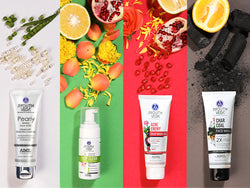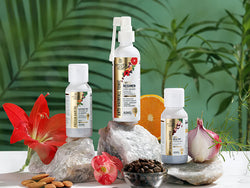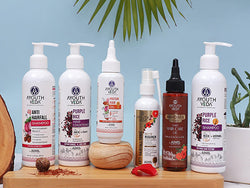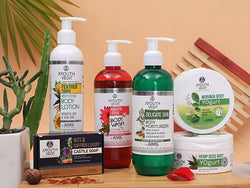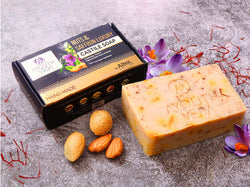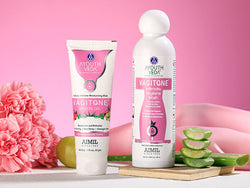Phytotherapy: Benefits, Uses, and Why It Matters Today
In today’s fast-paced world, most people rely on chemical-based treatments to heal their health, skin, or hair concerns. These solutions may deliver quick fixes but do not always address the root cause. Therefore, people are slowly shifting towards safer and long-term solutions.
Here comes Phytotherapy!
Most of you are not aware of this term; hence, this study brings you the effective use and benefits of phytotherapy in today’s world. Unlike synthetic drugs that only target symptoms, phytotherapy works holistically by supporting the body’s natural healing process and restoring balance from within — helping you achieve a natural glow with phytotherapy.
What is Phytotherapy?
Phytotherapy is derived from the Greek words phyto (plant) and therapeia (therapy), which means the use of plant or herb extracts to treat any health or skin-related concerns. It's a therapeutic process focused on overall well-being by studying the effective properties of medicinal plants.
Unlike random home remedies, phytotherapy relies on standardized extracts, where the active ingredients are carefully used to deliver consistent results.
Key Features:
-
🌿 Derived from ancient practices like Ayurveda, now merged with modern science.
-
🌿 Uses powerful healing herbs such as aloe vera, turmeric, ginger, and hibiscus.
-
🌿 Available in herbal teas, capsules, powders, oils, creams, and serums enriched with healing plant extracts — easy to include in daily routines.
Benefits of Phytotherapy
✅ Natural and Safe Healing
This herbal therapy uses bioactive compounds extracted from plants that the human body absorbs more easily than synthetic drugs, reducing side effects.
✅ Supports Holistic Well-being
Phytotherapy focuses on full body balance, not just treating symptoms. Adaptogenic herbs like Ashwagandha and Rhodiola improve overall resilience and vitality — supporting a natural glow with phytotherapy.
✅ Rich in Antioxidants
Most medicinal herbs are loaded with antioxidants that protect cells from free radicals. This helps:
-
Slow down ageing
-
Calm inflammation
-
Maintain heart health
✅ Wide Range of Applications
Plant-based therapy promotes overall well-being — supporting the body, skin, and hair from the inside out.
✅ Environmentally Sustainable
Phytotherapy uses remedies that are:
-
🌍 Biodegradable
-
🌿 Eco-friendly
-
🔄 Renewable
Compared to chemical-based pharmaceuticals, it’s a much greener alternative.
Common Uses of Phytotherapy
🌸 Skin and Hair Care
Herbs like Aloe vera, Neem, Bhringraj, Hibiscus, Turmeric, and Chamomile are known for their anti-inflammatory and healing properties.
This therapy is a natural choice for:
-
Combating acne and pigmentation
-
Reducing hair fall
-
Treating an unhealthy scalp
-
Promoting a natural glow with phytotherapy
🛡️ Boosting Immunity
Herbs such as Amla, Giloy, and Ginger strengthen the immune system and help the body fight infections naturally.
😌 Stress and Mental Health
Herbs like Ashwagandha, Valerian Root, and Tulsi help:
-
Reduce anxiety
-
Improve sleep
-
Balance mood
🍽️ Digestive Wellness
Herbs like Peppermint, Ginger, and Fennel help relieve:
-
Indigestion
-
Bloating
-
Nausea
🩺 Chronic Conditions
Phytotherapy is used to manage long-term health issues with herbs like:
-
Ginkgo biloba – supports memory
-
Turmeric – aids joint health
Why Phytotherapy Matters in Modern Life
In today’s world, people commonly suffer from:
-
Diabetes
-
Acne-prone skin
-
Obesity
-
Heart disease
-
Poor digestion
-
Stress
Most seek gentle, safe, and long-lasting solutions rather than temporary fixes — and this is where phytotherapy fits perfectly.
Why It Works:
-
✔️ Targets root causes rather than masking symptoms
-
✔️ Works well with a balanced lifestyle (diet, exercise, sleep)
-
✔️ Recommended by modern practitioners for natural healing
-
✔️ An environmentally friendly practice that respects nature
Safe Usage of Phytotherapy
Although phytotherapy is natural, it’s essential to use it responsibly and under expert guidance.
📌 Guidelines for Safe Use:
-
Choose high-quality, standardized plant extracts with proper labeling for purity and safety.
-
Always perform a patch test before applying herbal products on skin or scalp — especially for sensitive skin.
-
Consult a professional if pregnant or taking medications to avoid any risks.
-
Avoid overdosing — phytotherapy is a gentle practice that requires patience and consistency.
Key Takeaway
Phytotherapy is not just a random plant approach — it’s a systematic, scientific, and holistic solution combining ancient wisdom with modern research.
It connects Ayurvedic knowledge from ancient India with today’s scientific studies to provide effective care for skin, hair, body, and overall wellness.
Regular use of phytotherapy encourages a natural glow, helping you feel confident, youthful, and radiant from the inside out.
With patience and consistency, it becomes a sustainable lifestyle that supports long-term wellness — naturally.



